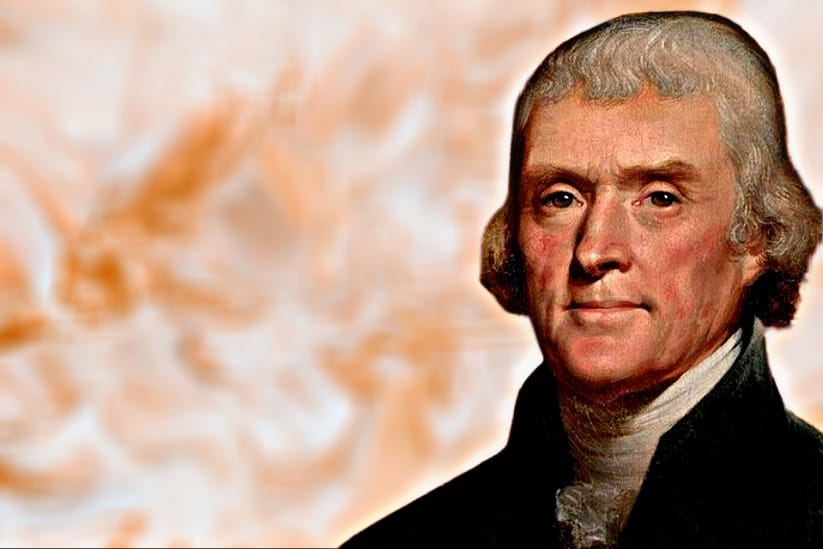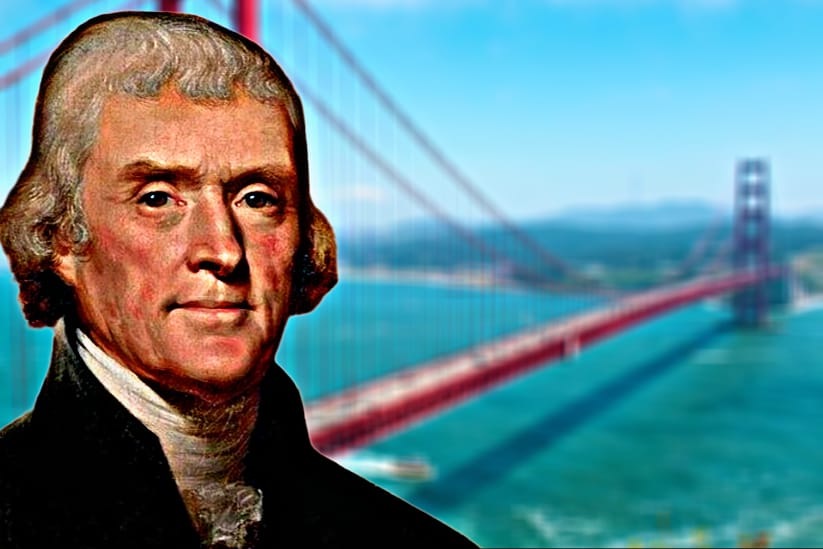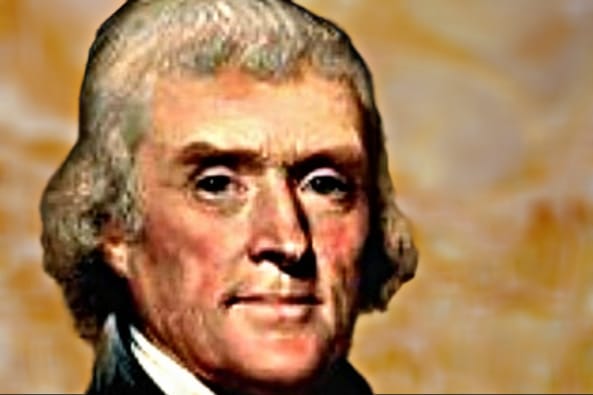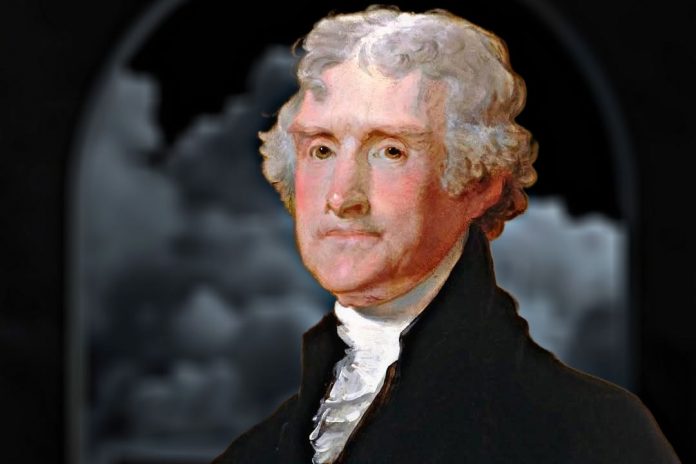Thomas Jefferson, the third President of the United States and one of the most influential Founding Fathers, remains a key figure in American history. Renowned for drafting the Declaration of Independence, establishing the foundation for the U.S. political system, and promoting values of liberty, equality, and democracy, Thomas Jefferson contributions have had a lasting impact on both the United States and the world. In this article, we explore Jefferson’s biography, his early life, education, political career, presidency, and his enduring legacy.
Early Life and Family Background of Thomas Jefferson
Thomas Jefferson was born on April 13, 1743, in Shadwell, Virginia, on the family estate known as the “Shadwell Plantation.” He was the third child of Peter Jefferson, a well-off landowner and surveyor, and Jane Randolph Jefferson, a member of one of Virginia’s oldest and most distinguished families. His early life was marked by privilege, and the Jeffersons were part of the Virginia gentry, which played an influential role in shaping his worldview.
Growing up on the family plantation, Thomas Jefferson had access to a variety of educational resources, which set the foundation for his future intellectual pursuits. His father, Peter Jefferson, was a successful surveyor who left his son a sizable estate and an appreciation for natural sciences and exploration.
Thomas Jefferson mother, Jane Randolph, was part of the Randolph family, which was well-connected in Virginia’s elite circles. This connection gave Jefferson access to some of the best tutors available at the time. His early education focused on Latin, Greek, history, and the sciences, which helped develop his deep curiosity and intellect.
Education of Thomas Jefferson

Thomas Jefferson formal education began at the age of nine, when he attended the school of a local priest, Rev. James Maury, who taught Latin, Greek, and classical literature. Jefferson’s insatiable curiosity led him to excel in his studies. At the age of 14, he entered the College of William & Mary in Williamsburg, Virginia, where he continued his classical education and further developed an interest in philosophy, science, and the Enlightenment ideals of reason and liberty.
At William & Mary, Thomas Jefferson became particularly close to Professor William Small, who mentored him in various subjects, including natural philosophy, mathematics, and the principles of scientific reasoning. This relationship had a profound influence on Jefferson’s intellectual development, and he later credited Small with introducing him to the ideas of John Locke, Francis Bacon, and other Enlightenment thinkers.
After graduating in 1762 at the age of 19, Thomas Jefferson studied law under the tutelage of George Wythe, one of Virginia’s most respected legal minds. Wythe, who was also a mentor to other notable Founding Fathers such as John Marshall, instilled in Jefferson a deep respect for law, justice, and the principles of self-government.
Thomas Jefferson’s Early Political Career
In 1769, at the age of 26, Thomas Jefferson was elected to the Virginia House of Burgesses, where he began his political career. He was soon recognized for his strong oratory skills and his commitment to defending colonial rights. Thomas Jefferson early political philosophy was shaped by his belief in individual liberty and limited government, values that would later influence his political actions as president.
Thomas Jefferson political career in Virginia was marked by his opposition to British colonial policies, including the Stamp Act and the Townshend Acts. During this time, he wrote A Summary View of the Rights of British America, a pamphlet that articulated the American colonies’ grievances against the British government. This document was a bold assertion of American rights and set the stage for Jefferson’s future role in the American Revolution.
In 1775, when the American colonies were on the brink of war with Britain, Thomas Jefferson was appointed to the Continental Congress, where he would contribute significantly to the cause of independence. It was here that Jefferson’s reputation as a statesman and political philosopher grew.
The Declaration of Independence

Perhaps the most defining moment in Thomas Jefferson’s career came in 1776 when he was chosen to write the Declaration of Independence. Jefferson’s ability to express the colonies’ desire for independence in a clear and powerful way is considered one of his greatest achievements. The Declaration, which was adopted on July 4, 1776, eloquently asserted that all men are created equal and have certain unalienable rights, including life, liberty, and the pursuit of happiness.
Thomas Jefferson writing of the Declaration was influenced by Enlightenment thinkers like John Locke, who argued that governments are formed to protect the natural rights of individuals. The Declaration marked the birth of a new nation, and Jefferson’s words became the foundation for the United States’ ideals of freedom and democracy.
Thomas Jefferson’s Post-Revolutionary Career
After the Declaration of Independence was signed, Jefferson continued his public service, returning to Virginia to serve in various roles. From 1779 to 1781, Jefferson served as the Governor of Virginia during the American Revolution. During his tenure, he faced numerous challenges, including British invasions and internal political strife. Despite these challenges, Jefferson remained committed to the cause of independence.
Following the war, Thomas Jefferson continued to be an influential figure in American politics. In 1784, he was appointed as the U.S. Minister to France, where he spent several years and became an avid observer of French society and politics. During his time in France, Jefferson gained a greater appreciation for the French revolutionary ideals of liberty, equality, and fraternity, which would influence his views on government and democracy.
Upon returning to the United States, Thomas Jefferson became involved in the formation of the new American government. He served as the first Secretary of State under President George Washington from 1790 to 1793, where he advocated for a foreign policy based on neutrality and diplomacy. Jefferson’s tenure as Secretary of State was marked by his belief in a limited federal government and his opposition to the centralizing policies of Alexander Hamilton, the Secretary of the Treasury.
Thomas Jefferson’s Presidency (1801-1809)

In 1801, Thomas Jefferson was elected as the third President of the United States. His presidency marked a significant shift in American politics, as he sought to implement a vision of limited government, individual rights, and westward expansion.
Key Achievements and Policies
1. The Louisiana Purchase (1803)
One of Thomas Jefferson most significant achievements was the Louisiana Purchase, a land deal with France that doubled the size of the United States. The acquisition, which included land stretching from the Mississippi River to the Rocky Mountains, opened up vast opportunities for westward expansion and settled the question of American territorial ambitions in the region. Though Jefferson initially had concerns about the constitutional legality of the purchase, he ultimately viewed it as a necessary step for the nation’s growth.
2. Lewis and Clark Expedition (1804-1806)
To explore the newly acquired western territories, Thomas Jefferson commissioned the Lewis and Clark Expedition, led by Meriwether Lewis and William Clark. The expedition provided invaluable information about the geography, plants, animals, and Native American tribes in the western part of the continent. Jefferson’s vision of westward expansion and his commitment to scientific discovery were realized through this groundbreaking journey.
3. The Embargo Act of 1807
In response to British and French interference with American shipping during the Napoleonic Wars, Jefferson passed the Embargo Act of 1807, which sought to protect American interests by halting trade with both nations. While the embargo hurt the U.S. economy, particularly in New England, it underscored Jefferson’s commitment to avoiding military conflict and maintaining American neutrality in international affairs.
4. The Reduction of National Debt
Thomas Jefferson fiscal policies were aimed at reducing the national debt, which had ballooned during the Revolutionary War and the presidency of George Washington. By cutting military spending and eliminating unnecessary government expenditures, Jefferson reduced the national debt by a significant amount during his two terms in office. His focus on frugality and limited government influenced the economic policies of future administrations.
Thomas Jefferson’s Later Years and Legacy
After leaving the presidency in 1809, Thomas Jefferson retired to his beloved Monticello estate in Virginia, where he continued to pursue his intellectual interests. He founded the University of Virginia in 1819, a project that reflected his commitment to education and the Enlightenment ideals that had shaped his worldview.
Thomas Jefferson later years were marked by his correspondence with other Founding Fathers, including John Adams, with whom he had a long and sometimes contentious relationship. However, by the end of their lives, Jefferson and Adams reconciled, and their letters became an important record of their shared experiences in shaping the American Republic.
Thomas Jefferson passed away on July 4, 1826, the 50th anniversary of the signing of the Declaration of Independence, a fitting coincidence given his central role in its creation. His death on this historic day was mourned across the nation, and his legacy as a champion of liberty, democracy, and American exceptionalism endures.
Thomas Jefferson’s Legacy and Impact
Thomas Jefferson legacy is vast and complex. As a Founding Father, he was instrumental in shaping the United States into the nation it became, with his advocacy for liberty, democracy, and westward expansion forming the bedrock of the American vision. His presidency saw the nation expand both territorially and ideologically, setting the stage for future generations to build upon his ideals.
However, Thomas Jefferson legacy is also marred by contradictions. Despite his commitment to liberty and equality, he was a slave owner, and his views on race were inconsistent with his principles of human rights. The legacy of Thomas Jefferson is thus a subject of ongoing debate, as historians grapple with the complexities of his life and contributions.
In conclusion, Thomas Jefferson was one of the most remarkable figures in American history. His ideas about government, freedom, and the rights of individuals laid the foundation for the United States and continue to shape American political thought today.

